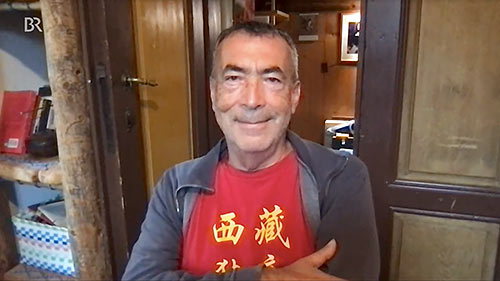ZEITEN & ZEICHEN
Hubert von Goisern at Circus Krone
The next concert is always just around the corner. That's how it goes for Hubert von Goisern. He'll be playing three big open airs in Bavaria in 2023 on his Neue Zeiten Alte Zeichen tour: Munich, Bad Reichenhall and Altusried. Last autumn he played at the Circus Krone and Bayern 2 was there to record him. The live recording can be heard on Bayern 2 at 15:05 on 9th and 10th April - or online right now.
The ground is melting away below the polar bears
After 71 concerts, Hubert von Goisern brought his Zeiten & Zeichen tour to a close with a home game on Wednesday – at least geographically and thematically speaking. Musically, he broadened horizons more than ever.
The Große Festspielhaus is not a dance hall. The rows of seats are too close together. The music was often too serious in character to be danceable. Thus at the end it took clear encouragement from the band for the audience to stand up. Straight into the euphoria of the song Brenna tuats guat, Hubert von Goisern's biggest career hit aside from Koa Hiatamadl. Dancing to a critique of capitalism in a temple of culture doesn't have to pose a conflict. Rather more, it is a symbol for large parts of the brilliant evening and for the ambivalence that the Goiserer has always formulated in his music. "Wer nu nia wen gern g'habt hat, der war nu nia allein ... es ist nix g'logn, was ned a wahr is" (If you've never loved someone, you've never really been alone … there's nothing true that's not also a lie) he sang many years ago. Or, on this evening, the last show of this year's tour: apocalypse and poetry, foreboding and bitter certainties, Dadaistic humour full of indictments of the world and love songs to make you melt.
Exactly 30 years since "Hiatamadl" hit the charts
Before they finally stood up, the audience wasn't seated for a good two hours out of boredom, they were pressed into their seats with concentration and sometimes perhaps surprise. First – for almost two hours – the Goiserer plays the songs of the new, or rather: most recent album. It's called Zeiten & Zeichen and was released a good two years ago. But then came the coronavirus and everything changed, and a lot had to be postponed. Numerous postponements of this concert also led to a little fuss about organisational flaws. It all kicked off 20 minutes late, as evidently some seats had been allocated twice.
Finally, Hubert von Goisern stood on the stage for this home game. In a few days he'll be 70. And it's exactly 30 years since Hiatamadl entered the charts on 8 November 1992. Back in the spring and autumn of 1992, the Goiserer played in little sports halls in places like Rußbach and Kuchl. The organiser from back then, a kind of early discoverer, was here this time too. What became one of the most astounding music careers in this country began in autumn 1992. And it's largely due to the fact that this man is constantly looking for what's new and fresh, so as to challenge both himself and his audience.
Hubert von Goisern: between operatics and straightforward rock, between accordion and electronic music
Things certainly turn introspectively melancholic when he plays the 30-year-old all-time hits Weit, weit weg and Heast as nit. The mainly older audience that has grown with the songs can comfortably reminisce. But first and foremost, it is made clearer than ever that this man does not allow himself to be pinned down, and that zigzagging between operatics and straightforward rock, accordion and electronic music has kept him interesting and alert for decades. He is constantly broadening his horizons.
So it is that a polar bear, for example, dances to calypso sounds and needs – according to the title of the song – "protein". Hot and cold together. A story like that could end in a marvellous anti-joke. The melody ripples, lively and hot. You could dismiss it as odd humour – like the later story of a Greenland shark on the search for love. But in the way that Hubert von Goisern and his band scamper through the Dadaistic story about the polar bear that needs protein at all costs, the fun turns out to be just one layer. The Goiserer lends a double meaning to the ice on which the bears (and us) are dancing. And the life-sustaining ice is melting away faster than is good for us. No lie; it's really true.
Societal consequences in a climate of division
A few songs later the fabulous band crashes into a cover of Nina Simone's song Sinnerman. Hubert von Goisern's version is called Sünder. And it's a reckoning with just about everything, accompanied by seductively intense sounds. "Power", the band calls out a few times in the song – accusation and incitement. It becomes clear in this song: nothing else must melt, for every façade has long been seen through and we have glimpsed the madness of liars and world destroyers. "Where will we run to on the final day?" sings the Goiserer. Like dancing the apocalypse. He then rails against the Brauner Reiter (Brown Rider), or rides with the Novemberpferde (November Horses), the one being a political threat, the other sprung from an anthology of poetry that invokes the longing for peace. And the subject turns to societal consequences in a climate of division. In Meiner Seel, the narrator is in disbelief at the relativisation and denial of facts and scientific knowledge. "I didn't set myself a specific motto, in contrast to some earlier projects. There was a point when I had 40 ideas and then I went to the studio and set to work. I didn't want to impose any limits on myself," said the Goiserer in an interview about the new songs.
There's unity with the audience even at the 71st concert
Though the music is multifaceted, it stays within its bounds. Yet a new world opens up song by song, and that is largely down to the band: Helmut Schartlmüller, Alex Pohn, Severin Trogbacher, Alex Trebo and the former member of Ganes, Maria Moling. With the exception of Trebo, they've all been playing with the Goiserer since the late 2000s. After 71 almost entirely sold-out concerts this year, they'll do the same next year – 15 new concert dates were announced recently. Special guests Lidia Baich (violin) and Georg Breinschmid (bass) joined them on stage at the Festspielhaus.
The audience's focus remains high throughout the show. And thematically, the Goiserer and his audience have always been a unit, reminiscent of cabaret. After all, who wouldn't be against dangerous dumbing down and threatening global warning? Who wouldn't be pleased when their own political foundations, as well as the longing for something such as love, were supported by the man up on stage with enormous drive and diverse rhythms?
The end and shallows of a world as we know it
The encouragement to dance brought by Brenna tuats guat is both a catharsis and concluding statement of the critical keynote – with regard to the concert, as the last song before the encores, it is the beginning of the end. But it's also fitting in other respects. Anyone listening carefully on this evening will hear the end and shallows of a world as we know it. This candid view of the distortions and wounds of highly personal as well as social existence has never been expressed musically with such a well-rehearsed band and thematically in such a mature, deep, refined, absurdly witty and stylistically varied way. That can also be said about most of the explicitly political, accurate remarks between the songs. The world is a target and not a dance hall. Early in the evening during El Ektro, one of the new songs, which unfolds as grinding electronic sound and delivers ironic surges of electricity, the Goiserer had declared "I don't want to dance". That may be the case for people's legs this evening, but in their heads there's a lot of rumination on what's moving the world at the moment.
Hubert von Goisern thrills at his concert at the Burghof, Lörrach
Hubert von Goisern played a memorable concert at the Burghof on Friday,on the one hand due to the long lead time, then to the artistic quality and finally to a particular incident: the hall had to be evacuated in the middle of the concert because of a faulty smoke alarm.
October 20, 21, and 22
What? Hubert von Goisern at the Burghof in Lörrach? Again? One might question it, since he'd already been announced with great fanfare twice before. But he wasn't on the Burghof stage in either 2020 or 2021. Back when his show in Lörrach was planned in October 2020 as part of the tour for his new album, there was none of this "craziness", "no war and no pandemic", says Hubert Achleitner, who has been merging traditional folk music with rock and electronic music under the name Hubert von Goisern since the late 1990s. His audience hasn't grown any younger either. Although there was the young bookseller, 33-years-old, who had managed to get a seat high up and at the back. She beams likes someone does at Christmas, when all troubles are behind them.
The audience
There was no dress code. Although von Goisern once designed a fashion label, most people left their Oktoberfest outfits in the wardrobe. The handsome 70-year-old – Hubert von Goisern was born in 1952 – clearly enchants more women than men. Weit, weit weg is one of the most beautiful songs in German-language rock music. There were no lighters, but it would have been the ideal atmosphere to hold these up to the ceiling of the Burghof. So beautiful.
Interval
No interval was planned for this concert. And when the stage curtain came down just after the introduction to a Goethe poem set to music, the world musician based in Austria exclaimed angrily: "Which idiot was that?!" The idiot was the security system. Even as a friendly voice on the tannoy asked the audience to leave their seats without delay due to security concerns, some people thought Hubert would now go to the Naumann pyramid and play unplugged. He didn't. In fact, along came the fire brigade because of a false alarm. After a quick review, the evening went on.
New album
The most recent album, released in 2020, is called Zeiten und Zeichen. Back then, Coronavirus was still a strange lung disease from China, Volodymyr Zelenskyy had been the freely-elected president of Ukraine for a year. But Hubert von Goisern had already musically recorded the signs of the time. When his alpine rock was given a contemporary update with a bombastic electronic sound painting at the start, the odd visitor longed for the origins of the Alpinkatzen. His piece Heast es nit, wie die Zeit vergeht has never been more current and perfectly implemented than with this introduction. Yes, you could hear the passage of time that evening.
The highlight
Some will have taken home the old songs as personal favourites, but Freunde, das Leben ist lebenswert was evidently planned as the highlight. It's the story of the two friends Fritz Beda-Löhner and Franz Lehar. Fritz wrote the lyrics to Lehar's operettas and when Fritz was sent to the concentration camp, Franz let it happen. Operetta bombast and rap, heldentenor and speech song, and a light show that amounted to a warning sign. The piece turns into a mini opera in timelapse.
Focus
Of course, the world musician and reconciler of cultures was the focus of the evening, but right behind him Maria Moling stole people's hearts. The percussionist played a great variety of instruments. When the South Tyrolean, who now lives in Munich, began to yodel, the whole hall held their breath. The technology played a part, but it didn't matter in the moment.
Caribbean sounds from Greenland
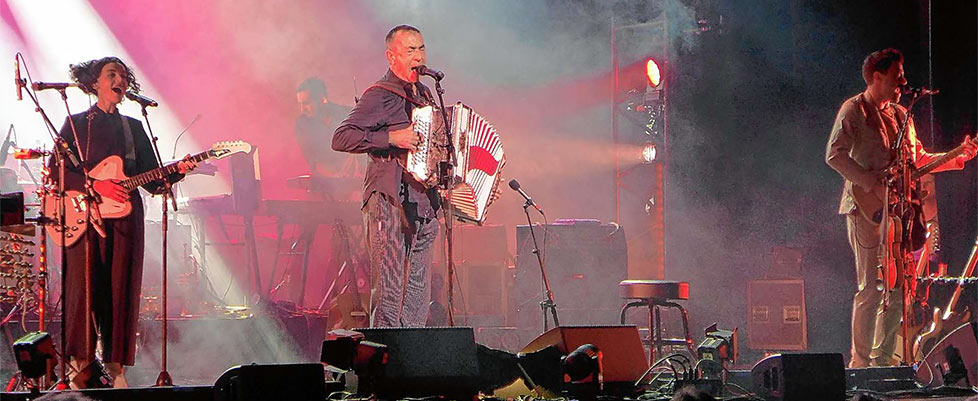
Lörrach. The introspective Landler-tune with which Hubert von Goisern opens demonstrates his lack of interest in the nostalgic aspects of the folk music of his country. Rather he uses them as a background for unique transformations and combinations with the musical finds he has picked up on his extensive travels around the world.
Presenting his new programme Zeiten & Zeichen at the sold out Burghof on Friday evening, he was supported by his perfectly matched fellow musicians Severin Trogbacher (guitar), Maria Moling (vocals, percussion), and Alex Trebo (keyboards).
Forced interval due to stage smoke: alarm
The rich, rocky sounds and vivid vocals in the song A Tag wie heut prove von Goisern is a world citizen, curious and open to communication with people of all kinds. It goes "Where are the saints, where are the sinners … Fill your tankard with beer … come sit with me". El Ektro reveals itself as a blissfully stoned song with the conclusion "I need plants to barricade myself!" This dance into another level of consciousness expresses itself with electronically distorted vocals, the ethereal sound of a theremin and a stage show full of disco lights and smoke.
The heavy smoke was ultimately the reason for an automatically triggered alarm and a forced interval in the fresh air for the unperturbed audience. According to the head of the fire brigade, the technology did exactly what it was meant to do.
Unfazed after the intermezzo, Hubert von Goisern talked about the genesis of his songs. He explained that the melody came first and the harmonies second and only then were the lyrics added. When he tried out one new song in particular on his wife, her comment was "what a shame". Trying to persuade himself that she simply didn't understand the matter wasn't effective in the long run, and so he saw the need for action and changed the lyrics. What emerged was an idiosyncratic love song with lines like "You don't know where I'm from, you don't know where I'm going", or "I'm the ebb and not the flow".
Serious message, ironic presentation
With a story like that, it is clear the singer is aware of wandering on thin ice as a creative. The song Eiweiß is about disappearing ice and polar bears. Inspired by his trips to the sparsely-populated East Greenland, he focuses on the climate catastrophe and the associated extinction of species. His message is conveyed with irony and wit and shaped by a certain playfulness with various musical world styles. "If you think it sounds Caribbean, you're right", he confirms, with an eye to global warming.
Whether it's jazz scatting over a solid, catchy harmonic foundation in Eiweiß, ghoulishly nostalgic accordion or ballad sounds from the flugelhorn – Hubert von Goisern remains faithful as an imaginative singer-songwriter with relevant messages.
A return to how things used to be
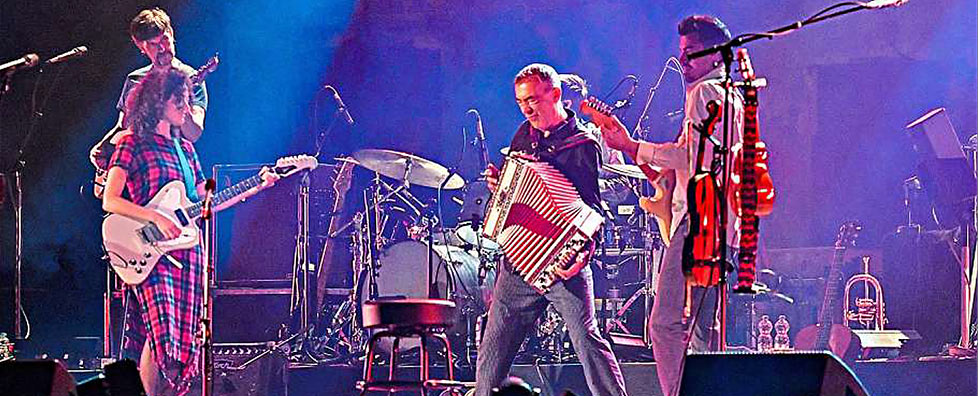
For two-and-a-half hours, Hubert von Goisern turns the Donau Arena into an oratory
Regensburg. Time flies – but frankly, you can't tell from looking at Hubert von Goisern. The Upper Austrian turns 70 soon. And seems as agile and enduring as someone 20 years his junior. Perhaps it's down to the fact that he has spent his life swimming against the current. After all, he once said, it builds muscle.
Here in the Donau Arena in Regensburg, he proves to be in great shape. And he quickly makes clear who calls the shots. That is to say, it's not a minority voice from the audience, loudly giving their twopenn'orth before he can even say that the current album Zeiten und Zeichen, released in September, will be the focus of the evening's programme. This will be a recurring theme in the next two-and-a-half hours: society is not advanced by friendliness alone.
Disagreement brings progress
Instead, it is disagreement and the associated struggles for one's own standpoint that make progress happen. And then he dedicates Jodler für Willi to his late friend. And talks about how this man loved to get wrapped up in conflict. And how much he loved the smallest creatures on this planet. Willi – who was a world leading expert – named one of these paramecia after Hubert, his partner in discourse: Rigidotrix Goiseri.
It became clear during this extremely entertaining evening how honest Hubert von Goisern was being with us, his audience: there was no Gabalier-style buttering up. Neither did he indulge in any sweet Silbereisen-esque puffed rice. Instead, he calls a spade a spade. With the song Freunde, das Leben ist lebenswert, he demands the kind of courage that operetta king Franz Lehár lacked when it came to protecting his librettist Fritz Löhner-Beda from the deadly grip of the Nazis.
And it's because he emancipates his audience that he's created the kind of feeling that in the best moments can be paraphrased with devotion and abandonment. Looking around, it was clear how many people were deeply moved. Who had closed their eyes. Swaying, lost in thought. And ready to hear such truths as these: when Zeiten und Zeichen was recorded, in 2019, the year before the pandemic, everyone was grumbling that things couldn't continue the way they were. "Now everyone wishes that things were the way they were back then." It is with sentences like these and a clear statement against anti-vaxxers that he stirs his audience into action.
The general musical quality was by no means overshadowed by MC Hubert von Goisern's own talent. In Maria Moling, Alex Pohn (drums), Helmut Schartlmüller (bass), Alex Trebo (keyboards) and Severin Trogbacher (guitar and violin), brilliant individual talents are on hand.
They form an ensemble and thus allow El Ektro to formulate a homage to Düsseldorf and Chicago (the hotbeds of electronically-produced dance music) brilliantly and with authentic quality.
A unified whole
Whether the yodels borne by alpine or Greenlandic folklore, a gospel by Nina Simone or collage with elements of operetta: it's all a unified whole. Presented not randomly, but with devotion and seriousness. "Don't put up with anything!", Hubert von Goisern bids farewell – not just quoting Kurt Ostbahn – but urging the kind of resistance that resilience makes possible in the first place.
The atmosphere? Impossible to describe

Hubert von Goisern delights his audience at the Sparkassen Arena
On Friday evening, the 2400-strong crowd in the almost sold-out Sparkassen Arena had another musical highlight to look forward to. Organiser Christoph Jung from Männerladen had managed to enlist none other than Hubert von Goisern and his band. The hall was full long before the start of the concert and the audience was visibly excited.
Hubert von Goisern's tour plans were affected by the corona pandemic, originally having been planned to hit the stage in 2020. Originally called the "Hubert von Goisern Tour 2020", it can now be called the "Zeiten und Zeichen Tour" in good conscience, fitting with the album of the same name, produced between the end of 2019 and February 2020. The new album was the musical focus of the evening.
At the end, he pulls out all the stops
Hubert von Goisern, born as Hubert Achleitner in Bad Goisern am Hallstättersee in 1952, is probably one of the most important representatives of so-called "alpine rock" with his mixture of rock music and traditional folk music – perhaps even the most important. He has proved his qualities as an excellent singer-songwriter and world musician, documented with appearances and recordings in Africa and Tibet for example, since the 1980s – back then with the legendary Alpinkatzen. And on Friday evening these qualities were impressively substantiated.
The mere stage presence of the Upper Austrian was enough to raise the mood in the hall. But what the sextet then conjured on stage was the expression of first-class songwriting paired with virtuoso playing and exuberant joy, which ran like a leitmotif through the evening right from the very first song A Tag wie heut until the end of the show. Supported by atmospheric lighting and superbly controlled sound, the album hit the bull's eye. Songs such as Eiweiß and Grönlandhai, arising from von Goisern's stays in Greenland and indicating the effects of climate change, as well as Future Memories and Meiner Seel proved to be deep and profound pieces from an overall brilliant work.
The choice of band members also hit the bull's eye, in particular Maria Moling, who repeatedly provided for almost mystical moments with her voice and her percussion.
Master of ceremony Hubert von Goisern led through the evening, explaining the background to how individual pieces developed. He was in the best of moods, captivating the audience with his pleasant, intimate approach. It went without saying that the band had no alternative but to play the loudly-demanded encores that were accompanied by a standing ovation. The atmosphere that arose is impossible to describe. With Weit, weit weg – the second verse spectacularly sung by Maria Moling – and Heast as nit, the world musician once more pulled out all the stops and left behind him a hall of people somewhere between ecstasy and tears of emotion.
Hubert von Goisern has his finger on the pulse
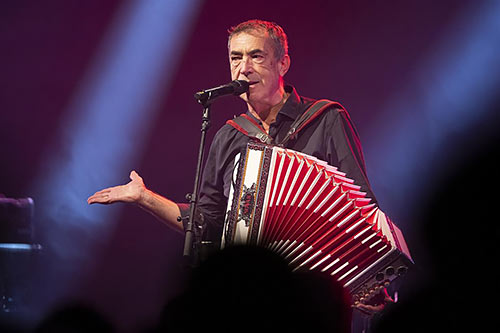
On Friday Hubert von Goisern presented his new album Zeiten & Zeichen and himself as a musical jack-of-all-trades at the sold-out SAL. The free spirit rocked, rapped, sang and yodelled: powerfully loud, touchingly tender, ironically masked and painfully open.
The ear protection handed out before the start of the two-and-a-half concert hinted that it would be loud at times. It was two years ago that TAK announced Hubert von Goisern's show with his album Zeiten & Zeichen, finished in 2019. How prophetic the album would be became clear shortly after its release, with the tour planned to begin in 2020 being postponed by the Covid pandemic. But now Hubert von Goisern from Bad Goisern (Austria), real name Hubert Achleitner, finally appeared in Liechtenstein. Anyone expecting enthusiastic alpine singing was barking up the wrong tree, even though the evening began with a cosy country dance. The free spirit influenced by numerous countries and cultures lives diversity in his music.
With a kind of exhalation from the accordion he was playing, the musician and his brilliant band took a harder, more rocking stance with A Tag wie Heut, only to completely turn things around again in the third song. El Elektro lives up to its name: techno beats in 1990s style. Pianist Alessandro Trebo running riot on the keyboards, Helmut Schartlmüller on bass, drummer Alex Pohn and guitarist Severin Trogbacher. Goisern's voice darkened to messages with modern autotune effects "I can chill without pills".
Melodies and stories
The musician outlined his creative process, which always starts with the melody, in the soft rock love song Dunkelblau, with an excellent slide guitar solo from the guitarist, who also played the violin in other works. The music tells Hubert von Goisern the story and normally he doesn't play his wife the song until he has the lyrics too. Here it was the other way around and he read her the lyrics first and then played the accompanying music. Disappointed, she answered: "What a shame". She thought the melody was too gloomy for the lyrics. He wrote a new one and played the original version of Dunkelrot as the final encore. In the songs Eiweiss and Grönlandhai the globetrotter dealt with the fatal effects of global warming in an ironic way. A polar bear who has no time for vegan food invited the audience to dance to Caribbean sounds – and this really got the mostly standing audience moving. The musician starts Grönlandhai, the Greenland shark, who dreams of a holiday in Hawaii, as a wonderfully melancholic chanson with an ocean drum and all kinds of percussion. Hubert von Goisern sang with intention, turning to the trumpet, and in later songs to the flugelhorn, harmonica and acoustic guitar.
Yodels, chansons, Rammstein
With the very touching Jodler für Willi the artist bid farewell to his late friend, the scientist Willi Foissner. The band took their first political stance against right-wing sentiments with Brauner Reiter, performed harshly in the style of Rammstein. The death dance Freunde elicited goosebumps. Franz Lehár, beloved by all the top Nazis, didn't get involved when his Jewish librettist Fritz Löhner-Beda was deported to a concentration camp and murdered. Rap interludes were excitingly mixed with operetta recordings: "Life is beautiful, so beautiful …". A drum solo introduced Sünder, a successful homage to the gospel sung by Nina Simone (1963). The piece rose in front of a red backdrop and posed increasingly pressing existential questions: "Nobody knows when the next one will go crazy". The thrilling dynamics of the musicians around the 69-year-old frontman increasingly transferred to the audience in front of the impressive stage with its perfectly coordinated light show. As encores, von Goisern played classics such as Weit, weit weg and Heast as nit from his beginnings with the Alpinkatzen - sing-along mainstays. The concert definitely set "signs of the time".
Hubert von Goisern - Live in Berlin

Hubert von Goisern: Live in Berlin - 21 September 2022
Photo: © Sarah Marchant
Hubert von Goisern: Live in Berlin - 21 September 2022
Photo: © Sarah Marchant
Hubert von Goisern: Live in Berlin - 21 September 2022
Photo: © Sarah Marchant
Hubert von Goisern: Live in Berlin - 21 September 2022
Photo: © Sarah Marchant
Hubert von Goisern: Live in Berlin - 21 September 2022
Photo: © Sarah Marchant
Hubert von Goisern: Live in Berlin - 21 September 2022
Photo: © Sarah Marchant
Hubert von Goisern: Live in Berlin - 21 September 2022
Photo: © Sarah Marchant
Hubert von Goisern: Live in Berlin - 21 September 2022
Photo: © Sarah Marchant
Hubert von Goisern: Live in Berlin - 21 September 2022
Photo: © Sarah Marchant
Hubert von Goisern: Live in Berlin - 21 September 2022
Photo: © Sarah MarchantSometimes he's deadly serious
Hubert von Goisern co-created alpine rock, but he refrains from the constant repetition of his hits. He presented a new programme at the Theater am Aegi that has morbid moments.
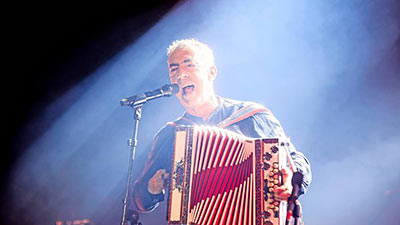 Hannover. Hubert von Goisern co-created alpine rock, but he refrains from the constant repetition of his hits. He presented a new programme at the Theater am Aegi that has morbid moments.
Hannover. Hubert von Goisern co-created alpine rock, but he refrains from the constant repetition of his hits. He presented a new programme at the Theater am Aegi that has morbid moments.
The warning at the beginning seemed a little cryptic at first. "Have you all read the small print?", Hubert von Goisern enquired of his audience at the almost sold-out Aegi theatre. Then it became clear. He intended to present his most recent album and not his old, well-known, virtually iconic songs that are no doubt expected by many. It soon became clear that the warning was an auspicious promise: Hubert von Goisern had reinvented himself again.
At the age of almost 70, the singer-songwriter seems no older than his young virtuoso band. The fact that he successfully co-created a new category in music history does not mean that he constantly repeats his musical feat. Instead, Goisern takes great joy in experimenting. He seems to gamble with the fact that new musical territory also harbours risks. The audience might not go along with it. But that wasn't an issue at the Aegi. Everyone was delighted – there was thunderous applause even before the first notes.
"I can chill without pills"
Hubert von Goisern enchants his audience with intelligent lyrics, a great deal of self-mockery and humour, changing between bitter and sweet. Ballads and chansons, at times sounding like the top of the charts, at times rocky, mostly melancholic, made the two-hour concert a special experience. Bit by bit at least it became clear that the new Goisern wasn't someone to clap along to. Sometimes coloured with dialect, sometimes in High German, the Austrian formed his rhymes with a tendency towards the surreal ("Ich kann auch ohne Pillen chillen" (I can chill without pills)), or grew deadly serious when the subject turned to Franz Lehár, the one behind The Merry Widow, and its librettist Fritz Löhner-Beda. Goisern sarcastically rhymes "Franz" with "Totentanz" (dance of death) and "Fritz" with "Auschwitz", as Franz Lehár did not wish to prevent the deportation of his friend to Auschwitz.
Attitude towards life with morbid traits
As the matured Goisern staged climate change with a Caribbean sound and a polar bear in Greenland, it became clear that he has a political message, which he set swinging and rocking admirably in Hannover with Maria Moling (vocals, percussion), Alex Pohn (drums), Helmut Schartlmüller (bass) and Severin Trogbacher (guitar).
The multi-instrumentalist leads from song to song with little stories, talks about the cover of the 2020 release, the ruins of a demolished brewery and shares an attitude towards life that certainly has morbid traits. His Austrian colleague, Georg Kreisler, seems to send his regards from afar. At the end, as the final encore, a wonderful love song Dunkelrot. And the now almost euphoric audience grows quieter. It was a wonderful and touching evening. Had the vocals and instruments been balanced better by the sound technician, it would even have been a superb evening.
Hubert von Goisern rocks and enchants in Stuttgart
Hubert von Goisern wants to enchant his audience with operetta, satire and a lot of emotion. But did he manage to do so at the Stuttgart Liederhalle?
He swings a little, folksy, sentimental and his band swings with him. He dances across the stage, the wildly stretching accordion in his hands. Then suddenly: a heavy guitar chord – and folk becomes alpine rock. Hubert von Goisern is in Stuttgart, on Friday evening, at the Liederhalle, the almost sold-out Liederhalle.
Yodelling in duet
He will celebrate his seventieth birthday in November, he has been playing new folk music for more than forty years. Hubert von Goisern explored the world and engaged with the musical traditions and instruments he came across in Africa, the USA, the Philippines and Tibet. He travelled through Europe on the Danube. With him was the Tyrolean group Ganes, of which Maria Moling was a member. She now accompanies Hubert von Goisern at his concerts, playing percussion, marimba, theremin, guitar and she also stands at the microphone and sings wonderfully in duet with him.
During this evening he sends his audience on another astounding journey, on which highly varied styles and emotions find their place alongside each other. Hubert von Goisern took his time with the release of his most recent album. Zeiten und Zeichen was released in September 2020, five years after its predecessor Federn. The newer songs form the majority of the concert – "That's fine", the artist says. "I can take it and so can you." You hear a lot of electronic sounds; biting criticism of contemporary issues and an unusual humour cross-fertilise each other. Hubert von Goisern talks about a journey to Greenland, on which he saw no polar bears. Then in Caribbean style he sings about a polar bear on the search for protein – his commentary on climate change.
Terribly beautiful Franz Lehár
A piece called Freunde is a small masterpiece from the Austrian globetrotter, on stage too, mixing operetta samples with rap. It tells the story of successful composer Franz Lehár, who wrote the most beautiful operettas of the previous century, was beloved by leading Nazis and did nothing when his Jewish librettist Fritz Löhner-Beda was deported and murdered: "Life is beautiful, so beautiful."
Alongside Maria Moling, who swirls across the stage in a green dress, Severin Trogbacher on guitar and violin, Alex Trebo on the keyboards, Helmut Schartlmüller on bass and Alex Pohn on drums, belong to the band. Roadie Hannes has a brief appearance as a chorus singer. Hubert von Goisern plays the accordion, trumpet, flugelhorn, yodels, sings in his distinctive voice, tells his stories.
The young grow old and the old have died
And before he sits alone with his acoustic guitar and begins a final song late on this marvellous evening, he sings some very old, beautiful songs with his band – Weit, weit weg, which he recorded with the Original Alpinkatzen in 1992, and Heast as nit from the same year: "Can't you hear how time is passing? The young have grown old and the old have died." A yodel wafts quietly through the Liederhalle and echoes long after.
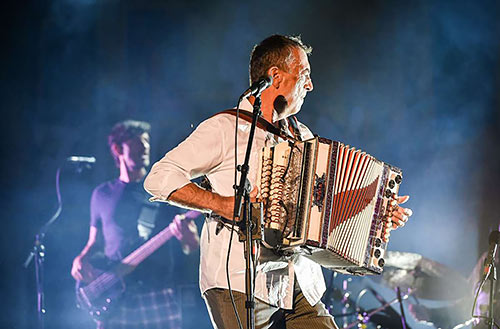
More photos at www.stuttgarter-zeitung.de
How Hubert von Goisern brought Mannheim's Rosengarten to its feet
Hubert von Goisern thrills the audience with his excellent band and his most recent, almost prophetic album Zeiten & Zeichen in the sold-out Mozartsaal of the Rosengarten in Mannheim.
A full Mozartsaal in Mannheim's Rosengarten has been a rare sight since the pandemic began. Even someone like Hubert von Goisern (HvG) wasn't guaranteed to completely fill it. But that's exactly what the 69-year-old Austrian and his excellent band managed with the same ease as they brought fans to their feet at the end of the concert. The anti-capitalist up-tempo alpine rocker Brenna tuats guat from 2011 has long been his most popular song and makes the audience – almost of all of the older generation -– completely freak out. Everyone is standing, dancing, singing, clapping – exuberance reigns.
The more than two-and-a-half-hour concert is a challenge – and a wonderful one at that. Because when it comes to von Goisern, you can encounter just about any musical style. The ingredients of alpine music grounded in his iconic accordion and yodelling are almost a footnote. With the third song, the voice is distorted in a contemporary style and effect-laden raps – the band adds an electro-beat, like Lambchop on speed. Otherwise, the spectrum of stylistic inspiration ranges from all sorts of world music as usual, additionally including borrowings from Nina Simone, Rammstein, operetta, calypso, jazz, rock and, more recently, even ballads, which sound as though they have been drawn from the American songbook – in High German. They are excellently implemented by guitarist and violinist Severin Trogbacher, drummer Alexander Pohn, bassist Helmut Schartlmüller and arranger Alex Trebo on the keyboard – as well as, first among equals, Maria Moling, the former Ganes multi-instrumentalist, who impresses as a percussionist, on the vibraphone and theremin, sings superbly and can yodel too. Great. Although von Goisern's yodelling has nothing to do with the horrors of the German folk music programmes from year dot. It is either deployed like an instrument or has a primal emotional effect, to express sadness for example (Jodler für Willi).
Everything peaks in Brenna tuats guat
Von Goisern is adaptable too: Aside from accordion and guitars, he plays the trumpet, harmonica and various flutes. The wide range of instruments is not an end unto itself, it is important in terms of content – without the ocean drum on the theremin, the comical number Grönlandhai would have neither the sounds of the sea nor the chirruping variants of whale song. The fact that a member of this venerable species, which normally lives unnoticed in the cold depths, was recently sighted in the Caribbean, is just a sign of how confusingly serious the situation of our time is.
HvG explains several times that he almost prophetically anticipated the mood of the last two and a half years, determined by war and the pandemic, on his album Zeiten & Zeichen, which was written in 2019 – and he still seems amazed by the fact. Especially since back in 2019, he had wanted to call this tour, which has been postponed several times, "Certainly Not Certain". The current album dominates with great songs such as the hard-hitting Brauner Reiter, Sünder, which grows to ten madly grooving minutes, the exhilarating Caribbean Eiweiß, Meine Seel', written as if against so-called unconventional thinkers, or the depressing epic about Holocaust murder ballad Freunde, resulting in a spectacular mixture in terms of content and music. It all culminates in Brenna tuats guat. And a very quiet encore with the classic ballads "Weit, Weit weg" with a choir of audience voices, Heast as nit and Dunkelrot.
Techno, rap and alpenglow
Even his management has previously been surprised at the audience's readiness to join in with the surprises that Hubert von Goisern has in store at his concerts. It was no different at the Rosengarten in Mannheim.
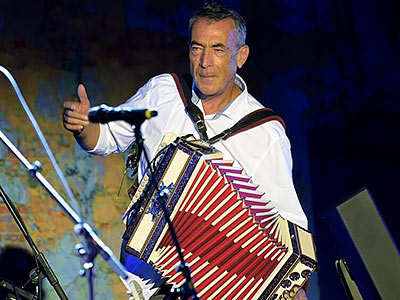
The evening kicks off with the Styrian accordion. A country dance in three-four time. That's how it all began, but the young Hubert Achleitner from Bad Goisern didn't want to stay still with this traditional music from his homeland. And the story took another turn in the Rosengarten too as the musicians joined in one by one. Things become wonderfully rocky.
It's not for nothing that Hubert von Goisern is regarded as the founder of alpine rock, the mixture of yodelling and accordion with robust drum rhythms and wild guitar. Just as with A Tag wie heut from the current album Zeiten & Zeichen. The new song goes down well, as far as you can tell from a look at the seated audience. But as soon as the groove is palpable, Hubert adds a catch: "I don't want to dance", he says and – oh, horror! – his voice is changed by a new-fangled autotune effect, a techno beat starts thumping, the synthesiser blabbers. The song is called El Ektro, another from the new album.
A really great band
At the climax, von Goisern's voice, which can agilely yodel, is violently chopped up into pitch shifts by the autotune. Of course, the whole thing is actually a parody. And Achleitner wouldn't be Achleitner if there weren't even more nuances. The drums and marimba don't come from the computer, they're played live by drummer Alexander Pohn and percussionist Maria Moling, who later sings and yodels wonderfully. Hubert has gathered a really great band around him: Severin Trogbacher doesn't just play various guitars, he plays ukulele and viola too. Helmut Schartlmüller picks the appropriate bass for each song and Alex Trebo, co-producer on the albums and arranger for the tour, has every sound from piano to funky sound effects saved on the keys.
Over the course of the evening, the master himself plays the trumpet, flugelhorn and flute in addition to the accordion. Or yodels alone: he dedicated Jodler für Willi to a friend. Willi Foissner was a scientist who researched protozoa. And he always asked von Goisern to bring him soil samples from his travels. In one test he found a hitherto undiscovered lifeform, which is now called Rigidotrix Goiseri. Private stories like that one bring people on stage that much closer to the audience. But Hubert von Goisern has always been someone who takes a stand and positions himself publicly.
He tells the story of Bedrich Löwy in Freunde (das Leben ist lebenswert). Löwy was the lyricist for operetta composer Franz Lehár, and a Jew. And Lehár kept quiet when the Nazis deported and murdered Löwy, despite his good relationship with leading Nazis. "Master of cowardice", von Goisern calls him. He relates the story as a rap, with the famous "Freunde, das Leben ist lebenswert", a tenor aria from Lehar's Giuditta, woven into the song.
Approachable and personal
It is a wild ride through themes and styles that Hubert von Goisern offers his listeners – or expects them to endure. But it is clear that the concept works. "I was alarmed when he started with speech song, because I can't bear rap. But then it was different after that", said an older lady on her way out. His manager had remarked, "your audience is capable of suffering", Hubert said in an interview with the Rheinpfalz. But perhaps it is receptive. What's certain is that von Goisern binds the audience to him in the way he presents himself to people. He is approachable and personal. He shows himself as a person and it wins him an affection that forgives when something doesn't suit personal taste. The high level of craftmanship that is always audible adds its own value. And as far as the parodies are concerned: only the skilled can get away with them.
At the end, after a good two hours without an interval, it all goes back to the early years with the Alpinkatzen: the audience sang along to Weit, weit weg, and so well that von Goisern didn't need to sing himself. Everyone stood up, Heast as nit followed, another of the early hits. And right at the end, just before half past ten, Achleitner sings Dunkelrot on the acoustic guitar, a wonderful love song.
"Music is always playing in my head"
The founder of alpine rock had his first great hit 30 years ago with "Koa Hiatamadl". Now Hubert von Goisern is back on tour and coming to Mannheim on Wednesday. Gereon Hoffmann spoke to the 69-year-old about traditional music and the wrong kind of applause.
Mr Achleitner, there are very different subjects, sounds and grooves on the album Zeiten & Zeichen. How did it turn out to be so varied?
My life is that varied. I didn't adopt any particular motto, which sets it apart from some earlier projects. There was a point when I had 40 ideas and then I went into the studio and worked on it. I didn't want to impose any barriers on myself.
That requires a lot of artistic freedom?
I took that liberty. Only my first record [Alpine Lawine, 1988] had a producer who told me that "this and that won't work". When I said that I actually wanted it that way, he just said that he'd made 20 records and knew what worked. But in the end it didn't work. The record was a flop.
You took things into your own hands from that point?
Yes, because I'm convinced that nobody really knows whether a record will do well or not. And I'd rather it be my own fault if I fall flat on my face. I then produced the next record (Aufgeigen statt niederschiassen, 1992) myself and offered it to the record companies as a finished product.
And that did well?
It was difficult because everyone told me I was too all over the place. It took two years for someone to accept the record.
You didn't think that your biggest hit, Koa Hiatamadl, would do well either?
When I make my music, I don't think about whether something will be a hit.
You leave a lot of time between your records. Does it take a call from the record company to get you to compose?
I'm actually always productive and music is always playing in my head. I don't notice it anymore. When I'm travelling with family, they sometimes say, "you're humming again". But I think it's like that for all composers. Then I write down the ideas and put them away in a drawer.
Does that explain why the pieces sound so varied, because their ideas developed at different times and under different circumstances?
Exactly. Then I go into the studio and look through everything. Also, I throw away a lot if it doesn't sound like anything.
Is it true that you initially hated the accordion that your grandfather had given you?
Yes, there was a conflict between me and traditional music. I wanted to undo the knots. But then, like Alexander and the Gordian knot, I did it with the sword.
Meaning?
I travelled a lot and the traditional music of many peoples always touched me. You feel something that reaches across generations and eras, you can feel the life of these people right away. And I asked myself why it didn't work with our tradition.
Because we had Nazis who stole our tradition?
Yes! But that can't have been it. And then later along came things like Musikantenstadl, which I think is terrible too. That's why I wanted to get back to the roots and tackle real folk music.
But you didn't play in the traditional style?
No, and the traditionalists hated me for it. And the left-wingers hated me because I played accordion and dealt with tradition. But people loved me.
But weren't you also applauded by the wrong side?
Yes. Right when I played the first big concerts, Jörg Haider was having his heyday. I was so ashamed that he came from the same town as me and was spreading such sick thoughts. But when I noticed that people from this direction were coming to my concerts and wanted to use them for their own purposes, I threw them out.
Really?
I stopped playing, picked these people out and said: "if you go now, you'll get your money back. Ten minutes from now, you won't." There were sometimes long pauses and my management and record company were pretty nervous about it. But I made it clear: I won't play for idiots.
You've never made a secret of your views – what about today?
Everything's wonderful in Germany, but in Austria there's a shitstorm directed at me for my stance. I can accept if someone doesn't get vaccinated, but I think conspiracy theories are stupid. And demonstrating in front of health authorities and bullying people, like the doctor who was driven to suicide, that's just too much. Those are sick minds. I'm getting threatening emails and am sometimes treated with hostility.
Do you compare your concerts today with those at the beginning of your career?
Back then it was alpine rock, that was 30 years ago and a different time. Today the spectrum is much broader. It's a ride through many styles and is a colourful world. It's certainly the most exciting concert since I began.
Hubert von Goisern brings the Culture Summer to a close
On Friday evening, Hubert von Goisern made a stop on his hotly anticipated Zeiten und Zeichen Tour 2022 at the Altötting Chapel. He had been taking a break from the stage since 2016, during which time he had not just published his debut novel Flüchtig and begun his radio show Steilklänge, but had also released a new album. He presented 14 songs from this album to the 1700-strong crowd, as well as to the "daredevils" who had made themselves comfortable on the benches, picnic rugs and in the cafes and restaurants outside the official concert arena.
Anyone expecting mainly catchy ballads and the rocking folk sound with which Goisern exploded like a bomb in the early 90s will have been surprised and challenged by the exuberant joy in experimentation of the almost 70-year-old. In the song El Ektro, he parodies this genre with an electronically distorted voice and hard beats, Wildschütz is prime hard rock and in Brauner Reiter he sings against right-wing philosophy: "Let us sing new songs!"
Even if such sounds seem out of place to the odd person, the message behind Hubert von Goisern's songs are often deeply Christian. No matter the skin colour, religion or political ideas, in the end everybody is the same. That's what A Tag wie heut is about, for example. In Sünder, von Goisern denounces mankind's sinning against creation, in Freunde the inhumanity of National Socialism.
This globetrotter Hubert Achleitner – his real name – is political, ironic and poetic. It is as though an elemental force bursts out of him when he enters the stage. He takes the Altötting audience on a journey through all the elements, from the earthy yodels of the Goisern homeland (Jodler für Willi), into the depths of the Arctic ocean (Grönlandhai), through the apocalyptic fire in Brenna tuats guat and into airy philosophical heights (Dunkelblau).
It is fitting that before the concert he gives the stage to a young musician who is just as resourceful, joyfully experimental and down to earth: Alex Cumfe from Kirchdorf am Inn. She travels forests all over the world to record the sounds of nature, from which she creates the songs for her project Her Tree. The audience is involved and the men are given a very special mission: in order to imitate the Brazilian jungle, they need to mimic the apes – they don't need to be asked twice and give it their best shot.
They give their best in the final part of the concert too, when Goisern finally strikes up some songs that everyone knows. As if reacting to an invisible sign, the crowd rises to their feet and takes up the chorus of the 2011 mega hit Brenna tuats gut, word perfect. The audience is in their element with Weit, weit weg, Spat and Heast as nit too and calls for another encore after the star shows his appreciation for the band: with Maria Moling (percussion, vocals), a long-time colleague of Goisern's and known to many from the band Ganes, Alex Pohn (drums), Helmut Schartlmüller (bass), Alex Trebo (keyboards) and Severin Trogbacher (guitar), he has great musicians at his side.
Right at the very end he takes after compatriot Rainhard Fendrich, who had thrilled his Altötting audience the night before: alone, with just his guitar, he comes back on stage and sings Dunkelrot, a love song. Warm. Soft. Calm. Like a lake in the Salzkammergut into which the sun sinks after the storm has passed.
Impressive "home game" from Hubert von Goisern
It took six years – in part due to the pandemic – before Hubert von Goisern was finally back on stage again in 2022. On Friday evening the 69-year-old played a much-celebrated open air concert at Burg Clam on his Zeiten und Zeichen tour, named after his current album. Two-and-a-half hours with plenty of new and old material, an unsurprisingly hefty portion of alpine elemental force, as well as melancholy, sensitivity and intensity.
The evening was in jeopardy at first by a long-threatening thunderstorm. But Clam castle in the southern Mostviertel in Upper Austria was ultimately spared and Hubert von Goisern and his fans were able to enjoy the "home game" entirely untouched by inclement weather, prompting Hubert von Goisern to declare "Thank you for pushing the clouds away!" The first part of the evening was dedicated entirely to the 2020 album Zeiten und Zeichen, kicking off with the rocky A Tag wie heit. The current work has an enormous range, from the usual critiques in alpine rock garb, to numerous excursions into a range of styles, at times reaching the edges of nonsense pop and parody.
Performed live, El Ektro for example turns out to be a special class of electronic beat blockbuster, but is actually intended as a complete piss-take of the genre. The dulcet pop style Eiweiß (Protein – which the polar bears always crave, for example in the form of human victims…) tells an eco-conscious tale about the life of the Inuits and the glaciers that are always calving due to global warming.
The anti-Rammstein & Co song Brauner Reiter was oppressively apt, as was in particular the content of the story of the Jewish operetta author Fritz Löhner-Beda (The Land of Smiles, Giuditta, Victoria and Her Hussar, The Flower of Hawaii), who, along with his entire family, was killed by the Nazis – something to which his composing partner of many years, Franz Lehar, turned a blind eye. And to tell this story impressively – and not at all awkwardly – in rap form was a true feat.
The final – great – example of the "unconventional Hubert von Goisern": Sünder (Sinners), also from the current album – almost a danceable apocalypse. And, of course, Corona & Co and their societal consequences in particular were the subject, for example the introduction to Meiner Seel' (Upon My Soul), which revolves around the now widely spread relativisation /denial of facts and scientific insights. The most unambiguous sentence: "There's only one global conspiracy theory and that is the one of stupidity."
At the end of great, long evening, Brenna tuats guat marked both a rousing highlight and the return to old familiar tunes. In the encores – particularly Weit weit weg and Heast as nit – Hubert von Goisern really stirred emotions – musicians and audience merged into a melancholy entity. Finally, he sat alone with a guitar and played the new ballad Dunkelrot, sung in High German. No doubt that this will please the numerous fans on the German leg of the tour that follows Saturday's concert in Tulln (Lower Austria).
Hubert von Goisern at the Lieder auf Banz festival
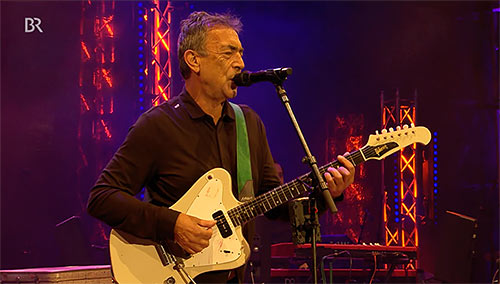
Watch Lieder auf Banz (HvG from 01:16:40)
The show will be broadcast on 15.08.22 at 22:45 on BR
Hubert von Goisern's open air at Kaiserpark, Bad Ischl
Klagenfurt: What a night!

More photos at www.facebook.com
A musical Jack of all trades
Thoughtful words and many hits. Hubert von Goisern thrilled his fans at an open air concert at the Neuer Platz in Klagenfurt.
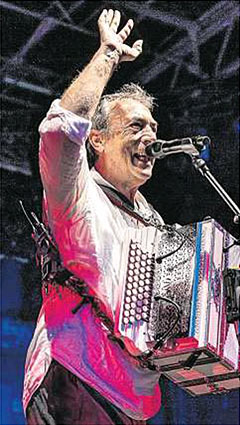 "Klagenfurt, hello", Hubert von Goisern welcomed the audience in the broadest Carinthian dialect, who weren't put off by the initial pouring rain and turned up in droves to the Neuer Platz.
"Klagenfurt, hello", Hubert von Goisern welcomed the audience in the broadest Carinthian dialect, who weren't put off by the initial pouring rain and turned up in droves to the Neuer Platz.
Goisern kicked off with the song A Tag wie heut (A Day Like Today): it's from his CD Zeiten und Zeichen, which was released in 2020 and forms the focus of this open air concert and his tour. The album is highly diverse and demonstrates the entire artistic bandwidth of the performer, who has perhaps grown rockier, but also more thoughtful: it's very socio-critical, an enduring feature of his lyrics.
It's unbelievable that Goisern is 69 years old – age seems to be but a number, it has left no trace at all. He has been on stage well over half his life. And he has lost none of his elan, his charisma and, in particular, his musicality, in which yodelling, the human primeval call, appears as a central element and his trademark: that's exactly how the Upper Austrian presented himself at his concert in Klagenfurt – a show that had been planned much earlier, but which had been postponed due to the pandemic.
It's been a long time since he was on tour; he was last in Klagenfurt in 2015: a world musician, an admonisher and a visionary who has always been ahead of his time and never lets himself be pigeonholed. He presented all his self-penned songs with a rousing five-member band, among them the excellent singer and musician Maria Moling. Highlights were without a doubt Sünder (Sinners) and Freunde … (das Leben ist lebenswert) (Friends … (Life is Worth Living)), a rap song about the Franz Lehár librettist Fritz Löhner-Beda, who was murdered in a concentration camp, and Jodler für Willi (Yodel for Willi), dedicated to a late friend.
Perhaps Hubert Achleitner, the widely travelled globetrotter, has grown more thoughtful, as was apparent in his quite critical moderation and because – aside from casual, witty songs such as Eiweiß (Protein) and Grönlandhai (Greenland Shark) – there were some quiet ballads were too.
For the finale he and his powerful, earthy and funky band sparked great enthusiasm with his super hit Brenna tuat's guat, getting the audience up out of their seats to dance along. Finally, two old hits Weit, weit weg and the tender Heast as nit invited the listeners to sing along.
Great applause!
Hubert von Goisern conquers the ZMF with his accordion
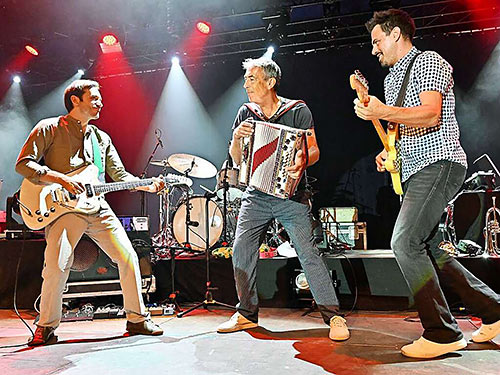
More photos at www.badische-zeitung.de
Hubert von Goisern in Winterbach
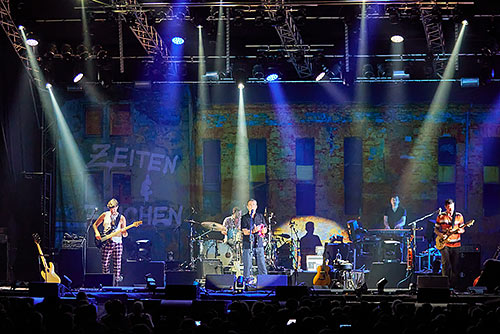
More photos at www.zeltspektakel.com


